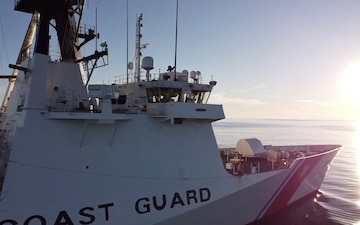Imagery Available: USCGC Stone underway for first patrol, Operation Southern Cross
U.S. Coast Guard sent this bulletin at 12/28/2020 03:31 PM EST
| News Release |
U.S. Coast Guard Atlantic Area |
USCGC Stone underway for first patrol, Operation Southern Cross
Newest national security cutter stretches operational reach
Editor's Note: to view video and more photos or download visit this story on DVIDS.
NORFOLK, Va. — The crew of the USCGC Stone (WMSL 758) departed from Pascagoula, Mississippi, Tuesday, just ahead of Christmas, for a multi-month deployment to the South Atlantic countering illegal, unregulated, and unreported fishing while strengthening relationships for maritime sovereignty and security throughout the region.
The brand new Legend-class national security cutter, one of the U.S. Coast Guard’s flagships, will provide a presence and support national security objectives throughout the Atlantic. This patrol is the cutter’s initial shakedown cruise following its delivery in November.
This the service’s first patrol to South America in recent memory, engaging partners including Guyana, Brazil, Uruguay, Argentina, and Portugal. The cutter also embarked an observer from the Portuguese navy for the operation’s duration.
Operation Southern Cross is conducted in conjunction with U.S. Southern Command, charged with managing operations in Central and South America by working collaboratively to ensure the Western Hemisphere is secure, free, and prosperous.
In September 2020, the Coast Guard released the Illegal, Unregulated, and Unreported Fishing Strategic Outlook, which reaffirms our commitment to global maritime security, regional stability, and economic prosperity.
Quotes
"The U.S. Coast Guard is committed to the protection of living marine resources. IUU fishing threatens the health of fish stocks and adversely impacts those who follow global norms and national laws. This is a global issue, and IUU is a problem too big for any one nation. Only by working together can we protect livelihoods, ensure ports remain economically productive, and support and sustainable fisheries industry. Stone's patrol demonstrates our commitment to the established rules-based order while addressing IUU fishing wherever a Coast Guard cutter is deployed."
- Vice Adm. Steven Poulin, commander of U.S. Coast Guard Atlantic Area.
“I am very proud of the professional men and women I serve alongside. It is no easy feat to assemble a crew and ready a cutter for sea – but this crew has had to perform this difficult task while observing protective measures associated with the Coronavirus-19 pandemic. The crew and I look forward to this historic first voyage, as Stone begins a storied career of service to this nation. While balancing training and qualification requirements, Stone’s crew will engage with partner nations in South America in a like-minded pursuit to curb illegal fishing tactics.”
- Capt. Adam Morrison, commanding officer of USCGC Stone (WMSL 758).
Quick facts
IUU Fishing
- Nearly half the world’s population relies on fish for 20 percent of their animal protein. IUU fishing removes access to this valuable protein source, particularly to the most vulnerable coastal States.
- The first sale value of global fish production in 2018 stands at $401 billion. IUU Fishing results in tens of billions of dollars of lost revenue to legal fishers every year.
- Of the world’s top marine fish stocks, 93 percent classified as fully exploited, overexploited or significantly depleted. IUU fishing undermines the sustainable management of these resources, pushing them to the limits of their capacity.
USCGC Stone
- The ship’s namesake is U.S. Coast Guard Cmdr. Elmer “Archie” Fowler Stone.
- On April 10, 1917, he became the Coast Guard’s first aviator upon graduating from flight training at Pensacola, Florida.
- In 1919, Stone was one of two pilots to successfully make a transatlantic flight in a U.S. Navy seaplane, NC-4, which landed in Portugal.
- NSCs are 418 feet (127 meters) long with a 54-foot beam and displace 4,500 tons with a full load. They have a top speed of 28 knots, a range of 12,000 miles, an endurance of 60 days, and a crew of around 120.
-USCG-




